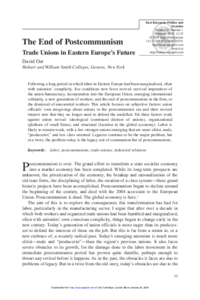The end of Postcommunism : trade unions in Eastern Europe's future

East European Politics and Societies
2009
23
1
February
13-33
labour relations ; trade unionization ; trade union
Trade unionism
English
Bibliogr.
"Following a long period in which labor in Eastern Europe had been marginalized, often with unionists' complicity, five conditions now favor revival: survival imperatives of the union bureaucracy, incorporation into the European Union, emerging international solidarity, a new generation of workers, and the end of postcommunism in the firm, or the dismissal of unessential workers. This article focuses on subjective factors: union officials' own misgivings about unions in the postcommunist era and their revived interest now that they no longer need to defend the unskilled. Yet three factors work against union revival: ideological (continued distrust of unions), organizational (plethora of small firms), and structural (location in the global economy). Labor is likely to remain weak, with a few stronger unions emerging that are more elitist, male, "producerist," and less class oriented. Legacies continue to be the major problem, but in a twist, the problem today is the legacy not of communism but of postcommunism. "
Digital
The ETUI is co-funded by the European Union. Views and opinions expressed are however those of the author(s) only and do not necessarily reflect those of the European Union or the ETUI.